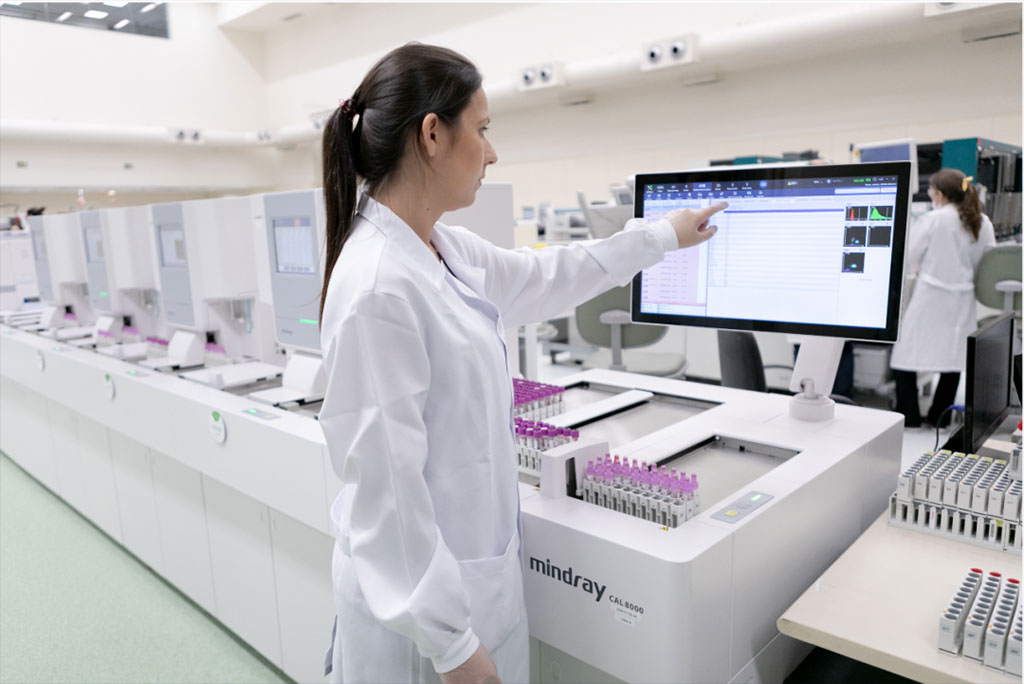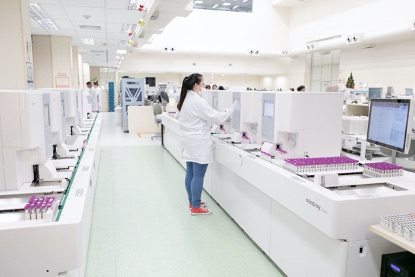Mindray Hematology Solution Helps High-Volume Lab Run 2,820,000 CBC Tests Annually
|
By LabMedica International staff writers Posted on 20 Oct 2020 |

Image: Mindray Hematology Solution Helps High-Volume Lab Run 2,820,000 CBC Tests Annually (Photo courtesy of Mindray)

Image: The customized Mindray CAL 8000 automation lines help the lab improve workflow and reduce manual handling (Photo courtesy of Mindray)

Image: Routes optimisation - Regular design and sample route (Photo courtesy of Mindray)

Image: Routes optimisation - Customized design and sample route(Photo courtesy of Mindray)
High-volume laboratories face several challenges, including high instrument failure rate, errors due to several manual steps, low efficiency and long TAT, and heavier workload for the lab staff.
Mindray’s (Shenzhen, China) hematology solutions can help labs face these challenges such as its tailor-made solution provided for CientíficaLab (Sao Paulo, Brazil) that now helps the high-volume lab run 2,820,000 CBC tests annually.
Owned by one of the largest diagnostic laboratory chains in the world, CientíficaLab provides clinical analysis service to 26 hospitals and 883 outpatient units in the Brazil public sector. Prior to its recent partnership with Mindray, CientíficaLab used to perform all its blood tests on more than a dozen stand-alone analyzers and slide makers, which were low in efficiency and demanded significant manpower. With overwhelming workload, the laboratory staff had to work extremely long hours, with three shifts a day, six days a week. High failure rate of the old instruments posed another daunting challenge for CientíficaLab, often resulting in extensive downtime.
After studying the laboratory’s challenges, Mindray came up with a tailor-made hematology automation solution for CientíficaLab. To automate its workflow and improve productivity, Mindray replaced the old stand-alone instruments with two high performance CAL 8000 Cellular Analysis Lines, each connecting four units of BC-6800Plus Auto Hematology Analyzers and one unit of SC-120 Auto Slide Maker and Stainer. Equipped with the labXpert data analysis software, the automation lines automatically validate test results and perform rerun and retest of abnormal hematology samples as per pre-defined rules. This helped reduce the laboratory's manual work substantially and improve its Standard Operating Procedures (SOPs).
After tracking the laboratory’s working path of samples, from collection to testing to microscopic analysis, Mindray provided a customized solution – placing the two automation lines face-to-face, but re-configuring one of them to make its sample route in the same direction as the other. This special design now enables just one technician to easily handle large amount of samples on both lines at the same time creating the shortest, most time-saving route from sample loading to unloading, all the way to microscopic review and result delivery.
During onsite inspection, Mindray discovered another possibility of helping CientíficaLab optimize its workflow. Before installing CAL 8000, the laboratory technicians had to print out the test result of the abnormal sample, and then bring the result along with the slide to the microscopy area for result comparison. These paper documents will be filed away for five years, managing which will be a demanding task. Mindray helped digitalize the process by installing the labXpert software at the microscopy area which allows data transfer and storage within the laboratory information system. Simply by scanning the barcode on the slides, technicians can now easily access the information of the test results during microscopic analysis.
Higher stability and reliability of the CAL 8000 system have also brought significant benefits for CientíficaLab in terms of enhanced efficiency and faster TAT. The laboratory used to have 11 stand-alone instruments that always had breakdown issues, with uptime of only around 60% to 70%. CientíficaLab had to wait for engineers to repair or spare parts to be sent which could take days and significantly impacted daily routine. The introduction of CAL 8000 with its reliability and stability has been a gift for the laboratory. Mindray analyzers rarely see any failure issues which are resolved on the very same day or no later than the next day by the company or its local distributor.
With the introduction of the two customized CAL 8000, CientíficaLab has achieved significant improvement in both production capacity and cost-effectiveness. With the full capacity of just one CAL 8000 being superior to the previous 11 instruments operated by CientíficaLab and two Mindray automation lines working in good condition, there has been a huge improvement in the lab’s performance. Today, CientíficaLab’s headquarters alone performs 3,000,000 different tests per month, with up to 9,000 hematology tests each day – totaling nearly 2,820,000 a year.
“With the introduction of CAL 8000, we have increased our testing capacity,” said Fabiana Gomes Lancelotti, Hematology Department Supervisor at CientíficaLab. “The SC-120 Slide Maker and Stainer makes slides for microscopic analysis, then the results will be automatically validated and ready to report.”
“By placing one CAL 8000 face-to-face with the other, and adjusting the sample routes in the same direction, we can reduce the number of staff and make the process much simpler. Our productivity has improved by 50%,” said Audrei Roberto Bertini, Production Manager at CientíficaLab.
Related Links:
Mindray
Mindray’s (Shenzhen, China) hematology solutions can help labs face these challenges such as its tailor-made solution provided for CientíficaLab (Sao Paulo, Brazil) that now helps the high-volume lab run 2,820,000 CBC tests annually.
Owned by one of the largest diagnostic laboratory chains in the world, CientíficaLab provides clinical analysis service to 26 hospitals and 883 outpatient units in the Brazil public sector. Prior to its recent partnership with Mindray, CientíficaLab used to perform all its blood tests on more than a dozen stand-alone analyzers and slide makers, which were low in efficiency and demanded significant manpower. With overwhelming workload, the laboratory staff had to work extremely long hours, with three shifts a day, six days a week. High failure rate of the old instruments posed another daunting challenge for CientíficaLab, often resulting in extensive downtime.
After studying the laboratory’s challenges, Mindray came up with a tailor-made hematology automation solution for CientíficaLab. To automate its workflow and improve productivity, Mindray replaced the old stand-alone instruments with two high performance CAL 8000 Cellular Analysis Lines, each connecting four units of BC-6800Plus Auto Hematology Analyzers and one unit of SC-120 Auto Slide Maker and Stainer. Equipped with the labXpert data analysis software, the automation lines automatically validate test results and perform rerun and retest of abnormal hematology samples as per pre-defined rules. This helped reduce the laboratory's manual work substantially and improve its Standard Operating Procedures (SOPs).
After tracking the laboratory’s working path of samples, from collection to testing to microscopic analysis, Mindray provided a customized solution – placing the two automation lines face-to-face, but re-configuring one of them to make its sample route in the same direction as the other. This special design now enables just one technician to easily handle large amount of samples on both lines at the same time creating the shortest, most time-saving route from sample loading to unloading, all the way to microscopic review and result delivery.
During onsite inspection, Mindray discovered another possibility of helping CientíficaLab optimize its workflow. Before installing CAL 8000, the laboratory technicians had to print out the test result of the abnormal sample, and then bring the result along with the slide to the microscopy area for result comparison. These paper documents will be filed away for five years, managing which will be a demanding task. Mindray helped digitalize the process by installing the labXpert software at the microscopy area which allows data transfer and storage within the laboratory information system. Simply by scanning the barcode on the slides, technicians can now easily access the information of the test results during microscopic analysis.
Higher stability and reliability of the CAL 8000 system have also brought significant benefits for CientíficaLab in terms of enhanced efficiency and faster TAT. The laboratory used to have 11 stand-alone instruments that always had breakdown issues, with uptime of only around 60% to 70%. CientíficaLab had to wait for engineers to repair or spare parts to be sent which could take days and significantly impacted daily routine. The introduction of CAL 8000 with its reliability and stability has been a gift for the laboratory. Mindray analyzers rarely see any failure issues which are resolved on the very same day or no later than the next day by the company or its local distributor.
With the introduction of the two customized CAL 8000, CientíficaLab has achieved significant improvement in both production capacity and cost-effectiveness. With the full capacity of just one CAL 8000 being superior to the previous 11 instruments operated by CientíficaLab and two Mindray automation lines working in good condition, there has been a huge improvement in the lab’s performance. Today, CientíficaLab’s headquarters alone performs 3,000,000 different tests per month, with up to 9,000 hematology tests each day – totaling nearly 2,820,000 a year.
“With the introduction of CAL 8000, we have increased our testing capacity,” said Fabiana Gomes Lancelotti, Hematology Department Supervisor at CientíficaLab. “The SC-120 Slide Maker and Stainer makes slides for microscopic analysis, then the results will be automatically validated and ready to report.”
“By placing one CAL 8000 face-to-face with the other, and adjusting the sample routes in the same direction, we can reduce the number of staff and make the process much simpler. Our productivity has improved by 50%,” said Audrei Roberto Bertini, Production Manager at CientíficaLab.
Related Links:
Mindray
Latest Industry News
- AI-Powered Cervical Cancer Test Set for Major Rollout in Latin America
- New Collaboration Brings Automated Mass Spectrometry to Routine Laboratory Testing
- Diasorin and Fisher Scientific Enter into US Distribution Agreement for Molecular POC Platform
- WHX Labs Dubai to Gather Global Experts in Antimicrobial Resistance at Inaugural AMR Leaders’ Summit
- BD and Penn Institute Collaborate to Advance Immunotherapy through Flow Cytometry
- Abbott Acquires Cancer-Screening Company Exact Sciences
- Roche and Freenome Collaborate to Develop Cancer Screening Tests
- Co-Diagnostics Forms New Business Unit to Develop AI-Powered Diagnostics
- Qiagen Acquires Single-Cell Omics Firm Parse Biosciences
- Puritan Medical Products Showcasing Innovation at AMP2025 in Boston
- Advanced Instruments Merged Under Nova Biomedical Name
- Bio-Rad and Biodesix Partner to Develop Droplet Digital PCR High Complexity Assays
- Hologic to be Acquired by Blackstone and TPG
- Bio-Techne and Oxford Nanopore to Accelerate Development of Genetics Portfolio
- Terumo BCT and Hemex Health Collaborate to Improve Access to Testing for Hemoglobin Disorders
- Revvity and Sanofi Collaborate on Program to Revolutionize Early Detection of Type 1 Diabetes
Channels
Clinical Chemistry
view channel
New PSA-Based Prognostic Model Improves Prostate Cancer Risk Assessment
Prostate cancer is the second-leading cause of cancer death among American men, and about one in eight will be diagnosed in their lifetime. Screening relies on blood levels of prostate-specific antigen... Read more
Extracellular Vesicles Linked to Heart Failure Risk in CKD Patients
Chronic kidney disease (CKD) affects more than 1 in 7 Americans and is strongly associated with cardiovascular complications, which account for more than half of deaths among people with CKD.... Read moreMolecular Diagnostics
view channel
Diagnostic Device Predicts Treatment Response for Brain Tumors Via Blood Test
Glioblastoma is one of the deadliest forms of brain cancer, largely because doctors have no reliable way to determine whether treatments are working in real time. Assessing therapeutic response currently... Read more
Blood Test Detects Early-Stage Cancers by Measuring Epigenetic Instability
Early-stage cancers are notoriously difficult to detect because molecular changes are subtle and often missed by existing screening tools. Many liquid biopsies rely on measuring absolute DNA methylation... Read more
“Lab-On-A-Disc” Device Paves Way for More Automated Liquid Biopsies
Extracellular vesicles (EVs) are tiny particles released by cells into the bloodstream that carry molecular information about a cell’s condition, including whether it is cancerous. However, EVs are highly... Read more
Blood Test Identifies Inflammatory Breast Cancer Patients at Increased Risk of Brain Metastasis
Brain metastasis is a frequent and devastating complication in patients with inflammatory breast cancer, an aggressive subtype with limited treatment options. Despite its high incidence, the biological... Read moreHematology
view channel
New Guidelines Aim to Improve AL Amyloidosis Diagnosis
Light chain (AL) amyloidosis is a rare, life-threatening bone marrow disorder in which abnormal amyloid proteins accumulate in organs. Approximately 3,260 people in the United States are diagnosed... Read more
Fast and Easy Test Could Revolutionize Blood Transfusions
Blood transfusions are a cornerstone of modern medicine, yet red blood cells can deteriorate quietly while sitting in cold storage for weeks. Although blood units have a fixed expiration date, cells from... Read more
Automated Hemostasis System Helps Labs of All Sizes Optimize Workflow
High-volume hemostasis sections must sustain rapid turnaround while managing reruns and reflex testing. Manual tube handling and preanalytical checks can strain staff time and increase opportunities for error.... Read more
High-Sensitivity Blood Test Improves Assessment of Clotting Risk in Heart Disease Patients
Blood clotting is essential for preventing bleeding, but even small imbalances can lead to serious conditions such as thrombosis or dangerous hemorrhage. In cardiovascular disease, clinicians often struggle... Read moreImmunology
view channelBlood Test Identifies Lung Cancer Patients Who Can Benefit from Immunotherapy Drug
Small cell lung cancer (SCLC) is an aggressive disease with limited treatment options, and even newly approved immunotherapies do not benefit all patients. While immunotherapy can extend survival for some,... Read more
Whole-Genome Sequencing Approach Identifies Cancer Patients Benefitting From PARP-Inhibitor Treatment
Targeted cancer therapies such as PARP inhibitors can be highly effective, but only for patients whose tumors carry specific DNA repair defects. Identifying these patients accurately remains challenging,... Read more
Ultrasensitive Liquid Biopsy Demonstrates Efficacy in Predicting Immunotherapy Response
Immunotherapy has transformed cancer treatment, but only a small proportion of patients experience lasting benefit, with response rates often remaining between 10% and 20%. Clinicians currently lack reliable... Read moreMicrobiology
view channel
Comprehensive Review Identifies Gut Microbiome Signatures Associated With Alzheimer’s Disease
Alzheimer’s disease affects approximately 6.7 million people in the United States and nearly 50 million worldwide, yet early cognitive decline remains difficult to characterize. Increasing evidence suggests... Read moreAI-Powered Platform Enables Rapid Detection of Drug-Resistant C. Auris Pathogens
Infections caused by the pathogenic yeast Candida auris pose a significant threat to hospitalized patients, particularly those with weakened immune systems or those who have invasive medical devices.... Read morePathology
view channel
Engineered Yeast Cells Enable Rapid Testing of Cancer Immunotherapy
Developing new cancer immunotherapies is a slow, costly, and high-risk process, particularly for CAR T cell treatments that must precisely recognize cancer-specific antigens. Small differences in tumor... Read more
First-Of-Its-Kind Test Identifies Autism Risk at Birth
Autism spectrum disorder is treatable, and extensive research shows that early intervention can significantly improve cognitive, social, and behavioral outcomes. Yet in the United States, the average age... Read moreTechnology
view channel
Robotic Technology Unveiled for Automated Diagnostic Blood Draws
Routine diagnostic blood collection is a high‑volume task that can strain staffing and introduce human‑dependent variability, with downstream implications for sample quality and patient experience.... Read more
ADLM Launches First-of-Its-Kind Data Science Program for Laboratory Medicine Professionals
Clinical laboratories generate billions of test results each year, creating a treasure trove of data with the potential to support more personalized testing, improve operational efficiency, and enhance patient care.... Read moreAptamer Biosensor Technology to Transform Virus Detection
Rapid and reliable virus detection is essential for controlling outbreaks, from seasonal influenza to global pandemics such as COVID-19. Conventional diagnostic methods, including cell culture, antigen... Read more

















